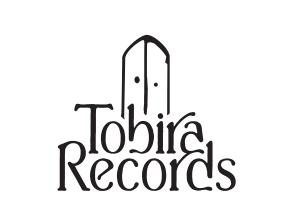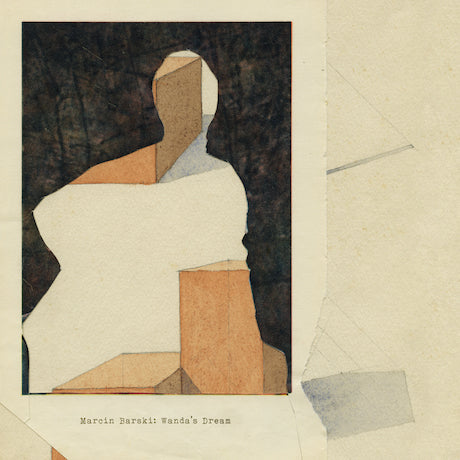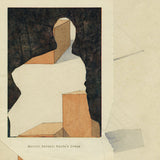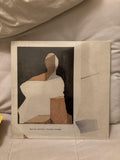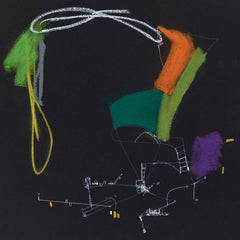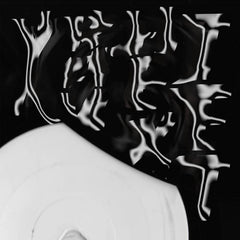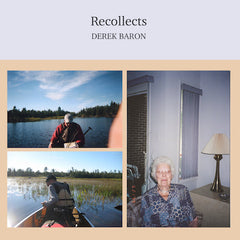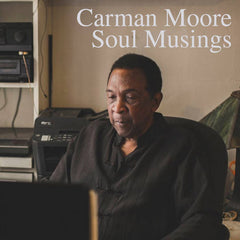Marcin Barski // Wanda's Dream LP
- Availability:
ポーランド・クラクフの実験音楽家Marcin Barskiが、2018年にアメリカ・NYの実験レーベルReading Groupからリリースしたレコードです。
スポークンワード〜物音ドローン4曲を収録。DLコード付属。
以下、作家本人による解説です。
"1980年代は特別だった。多くの家庭でマイクが当たり前のように使われるようになったのだ。音声録音はもはや珍しいことではなく、誰もができるようになった。ディクタフォン・オプションの付いた携帯ウォークマン、アナログの留守番電話、自分の声をアーカイブするために話しかけるための赤いボタンと小さな穴が常に装備されたテーププレーヤーなど、これらすべてがどこにでもあり、誰もがその使い方を知っていた。テープの値段は格安だった。そして、その多くは今日まで生き残っている。
これらのテープには、失望というテーマが繰り返し登場する。妨害されたラジオ・フリー・ヨーロッパの放送、何年も前に笑えなくなった(笑えたとしても)下品な性差別主義者のキャバレー、そして何よりも、新しい税金や日常生活の難しさ、あるいは電話システムに対する不満や、海外の親戚と話す前に電話で何時間も待たされることなどが語られている。
ポピエルシュコ神父の真理についての説教が録音されたテープが、赤と白のインレイカードにトラックリストが手書きされたモダントーキング・カセットに偽装されていることは珍しくない。1980年代の非合法なアンダーグラウンド・サーキットでは、視覚は聴覚を覆い隠すものとして機能した。当時のポーランドのサウンドスケープは、想像力のレベルで起こっていた。見たこともないもの、会ったこともない人々の声、コンサートでは体験できない音楽の録音を、人々はテープに録音して共有していた。聴覚は、彼らの視覚への憧れを形作っていたのだ。聴覚は、そうでなければあまりにも灰色から抜け出せない現実を変える力を持っていた。
先日、1982年から1984年にかけての電話での会話を録音したテープの箱を見つけた。録音していたヤンという男は、この数年間、電話で交わした会話をすべて記録していた。彼の妻は当時ウィーンに住んでいて、ワルシャワで友人たちに配る西洋製品を彼に送っていた。しかし、彼はロマンチックな男でもあった。箱の底に貼られたテープのタイトルは(鉛筆の手書きで)『ワンダの夢、1982年5月』。誰かのいびきを録音した8分ほどの静かなものだ。ヤンは妻の寝息を聞き返したことがあるのだろうか?ワルシャワの灰色の共産主義アパートで、テレビの両チャンネルの放送が終わった後、このテープを聴きながら眠りについたのだろうか。カラフルな資本主義のウィーンにあるワンダの寝室の音、匂い、見た目を想像しようとしたことがあっただろうか?ここでもまた、失望が繰り返される。ある意味、ヤンは多夫多妻の生活を送っていた。どちらも目に見えないが、どちらが現実なのだろうか?"
レーベルその他作品はこちら /// Click here to see more Reading Group releases available at Tobira.
-------------------------
Includes DL code. 12" black vinyl.
Tracklist:
- Wanda's Dream 11:49
- Jammed by the Soviets 05:01
- Sermons over Modern Talking 06:10
- Conversation with Father 11:45
Artist statement / text excerpt by Marcin Barski :
"The 1980s were special. It was then when microphones became a natural common part of the equipment of many households. Audio recordings were no longer unusual: everyone could make them. Handheld walkmans with a dictaphone option, analogue answering machines, tape players always equipped with a red button and a tiny hole to which one should speak in order to have their voice archived – all of these were to be found pretty much everywhere and pretty much everyone knew how to use them. There was no philosophy behind it: tapes cost pennies. And many of them have survived to this day. (...)
Disappointment is a recurrent theme in these tapes. The jammed Radio Free Europe broadcasts, the vulgar sexist cabarets which stopped being funny many, many years ago (if they were ever funny at all) and above all the conversations describing new taxes, the difficulties of everyday life, or even complaints about the phoning system and the need to wait hours by the phone before being able to speak to relatives abroad.
It is not uncommon to find tapes with Father Popieluszko’s sermons about truth, disguised (perhaps to fool the militia?) as Modern Talking cassettes, with the tracklist handwritten on the red and white inlay card. In the illegal underground circuit of the 1980s, the visual could function just as a cover-up for the audial. The Polish soundscape back then was very much happening on the level of the imagination. On tapes, people were sharing things they had never seen, the voices of people they had never met and recordings of music they could never experience live in a concert. The audial was shaping their longing for the visual. The audial had the power of changing a reality which otherwise was too much stuck in its greyness. (...)
The other day, I found a box of tapes with recordings of phone conversations from 1982-1984. The man who was recording them – Jan – documented every single talk he had over the phone throughout these years. His wife lived in Vienna at that time and was sending him Western goods that he distributed in Warsaw among friends. But he was also a romantic guy: the tape on the bottom of the box was titled (in handwriting in pencil) «Wanda’s Dream, May 1982». It’s a quiet, 8-minute long recording of someone’s snoring. Did Jan ever listen back to his wife sleeping? Did he go to sleep in a grey communist Warsaw flat with this tape on after both TV channels had finished their broadcasts? Did he ever try to imagine the sounds, the smells and the looks of Wanda’s bedroom in colorful capitalist Vienna? Again, disappointment is a recurring theme. In a way, Jan lived a polygamic life, with one wife behind many passport controls and another one on his tapes. Both invisible, but which one was more real?"
Artist : Marcin Barski
Label : Reading Group
ポーランド・クラクフの実験音楽家Marcin Barskiが、2018年にアメリカ・NYの実験レーベルReading Groupからリリースしたレコードです。
スポークンワード〜物音ドローン4曲を収録。DLコード付属。
以下、作家本人による解説です。
"1980年代は特別だった。多くの家庭でマイクが当たり前のように使われるようになったのだ。音声録音はもはや珍しいことではなく、誰もができるようになった。ディクタフォン・オプションの付いた携帯ウォークマン、アナログの留守番電話、自分の声をアーカイブするために話しかけるための赤いボタンと小さな穴が常に装備されたテーププレーヤーなど、これらすべてがどこにでもあり、誰もがその使い方を知っていた。テープの値段は格安だった。そして、その多くは今日まで生き残っている。
これらのテープには、失望というテーマが繰り返し登場する。妨害されたラジオ・フリー・ヨーロッパの放送、何年も前に笑えなくなった(笑えたとしても)下品な性差別主義者のキャバレー、そして何よりも、新しい税金や日常生活の難しさ、あるいは電話システムに対する不満や、海外の親戚と話す前に電話で何時間も待たされることなどが語られている。
ポピエルシュコ神父の真理についての説教が録音されたテープが、赤と白のインレイカードにトラックリストが手書きされたモダントーキング・カセットに偽装されていることは珍しくない。1980年代の非合法なアンダーグラウンド・サーキットでは、視覚は聴覚を覆い隠すものとして機能した。当時のポーランドのサウンドスケープは、想像力のレベルで起こっていた。見たこともないもの、会ったこともない人々の声、コンサートでは体験できない音楽の録音を、人々はテープに録音して共有していた。聴覚は、彼らの視覚への憧れを形作っていたのだ。聴覚は、そうでなければあまりにも灰色から抜け出せない現実を変える力を持っていた。
先日、1982年から1984年にかけての電話での会話を録音したテープの箱を見つけた。録音していたヤンという男は、この数年間、電話で交わした会話をすべて記録していた。彼の妻は当時ウィーンに住んでいて、ワルシャワで友人たちに配る西洋製品を彼に送っていた。しかし、彼はロマンチックな男でもあった。箱の底に貼られたテープのタイトルは(鉛筆の手書きで)『ワンダの夢、1982年5月』。誰かのいびきを録音した8分ほどの静かなものだ。ヤンは妻の寝息を聞き返したことがあるのだろうか?ワルシャワの灰色の共産主義アパートで、テレビの両チャンネルの放送が終わった後、このテープを聴きながら眠りについたのだろうか。カラフルな資本主義のウィーンにあるワンダの寝室の音、匂い、見た目を想像しようとしたことがあっただろうか?ここでもまた、失望が繰り返される。ある意味、ヤンは多夫多妻の生活を送っていた。どちらも目に見えないが、どちらが現実なのだろうか?"
レーベルその他作品はこちら /// Click here to see more Reading Group releases available at Tobira.
-------------------------
Includes DL code. 12" black vinyl.
Tracklist:
- Wanda's Dream 11:49
- Jammed by the Soviets 05:01
- Sermons over Modern Talking 06:10
- Conversation with Father 11:45
Artist statement / text excerpt by Marcin Barski :
"The 1980s were special. It was then when microphones became a natural common part of the equipment of many households. Audio recordings were no longer unusual: everyone could make them. Handheld walkmans with a dictaphone option, analogue answering machines, tape players always equipped with a red button and a tiny hole to which one should speak in order to have their voice archived – all of these were to be found pretty much everywhere and pretty much everyone knew how to use them. There was no philosophy behind it: tapes cost pennies. And many of them have survived to this day. (...)
Disappointment is a recurrent theme in these tapes. The jammed Radio Free Europe broadcasts, the vulgar sexist cabarets which stopped being funny many, many years ago (if they were ever funny at all) and above all the conversations describing new taxes, the difficulties of everyday life, or even complaints about the phoning system and the need to wait hours by the phone before being able to speak to relatives abroad.
It is not uncommon to find tapes with Father Popieluszko’s sermons about truth, disguised (perhaps to fool the militia?) as Modern Talking cassettes, with the tracklist handwritten on the red and white inlay card. In the illegal underground circuit of the 1980s, the visual could function just as a cover-up for the audial. The Polish soundscape back then was very much happening on the level of the imagination. On tapes, people were sharing things they had never seen, the voices of people they had never met and recordings of music they could never experience live in a concert. The audial was shaping their longing for the visual. The audial had the power of changing a reality which otherwise was too much stuck in its greyness. (...)
The other day, I found a box of tapes with recordings of phone conversations from 1982-1984. The man who was recording them – Jan – documented every single talk he had over the phone throughout these years. His wife lived in Vienna at that time and was sending him Western goods that he distributed in Warsaw among friends. But he was also a romantic guy: the tape on the bottom of the box was titled (in handwriting in pencil) «Wanda’s Dream, May 1982». It’s a quiet, 8-minute long recording of someone’s snoring. Did Jan ever listen back to his wife sleeping? Did he go to sleep in a grey communist Warsaw flat with this tape on after both TV channels had finished their broadcasts? Did he ever try to imagine the sounds, the smells and the looks of Wanda’s bedroom in colorful capitalist Vienna? Again, disappointment is a recurring theme. In a way, Jan lived a polygamic life, with one wife behind many passport controls and another one on his tapes. Both invisible, but which one was more real?"
Artist : Marcin Barski
Label : Reading Group
